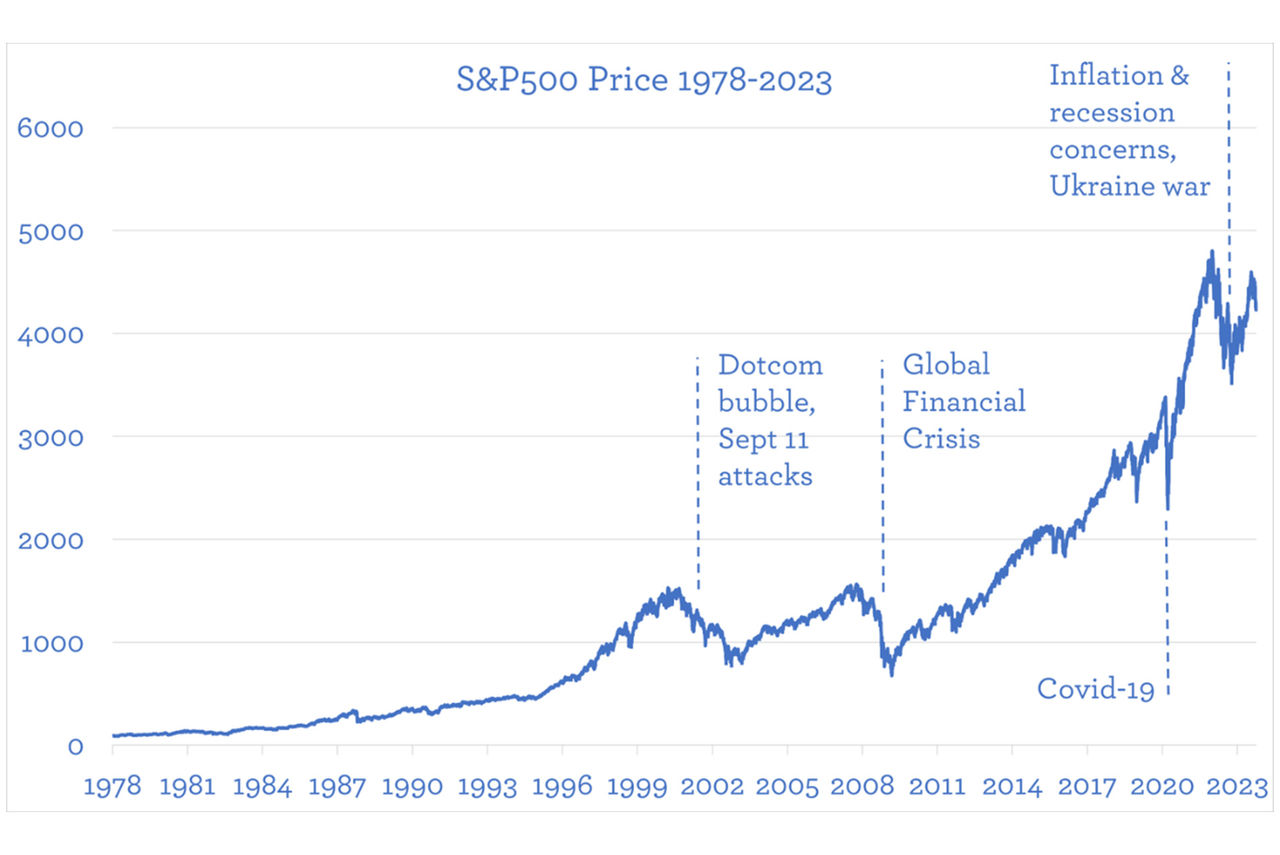
Why invest for the long-term?
Investing is a long game, so take a long-term perspective.
The world of investing can be thrilling, nerve-wracking, and everything in between. If you're new to investing, you might be wondering where to start. The answer for many lies in a simple strategy: long-term investing.
In this guide you’ll learn what long-term investing is, the benefits and disadvantages, and how to get started.
What is long term investing?
Long-term investing is a strategy focused on holding investments for an extended period, typically ten years or more. The goal is to ride out market ups and downs and benefit from potential growth over time.
Benefits of long-term investing

You ride out ups and downs
Shares tend to be considered long-term investments. This is partly because it's not unusual for the value of shares to drop by 10-20% or more over the short term. Investors have the opportunity to ride out some of these market ups and downs over many years (or decades) to generate a better long-term return.
Looking at historical share market returns, investors have rarely lost money investing in the S&P 500 when taking a long-term approach. Even considering setbacks, such as the tech bubble, the global financial crisis, and Covid-19, investors would have experienced gains had they made an investment in the S&P 500 and held it for 10 to 20 years.
While past performance is no guarantee of future returns, it does suggest that long-term investing in shares generally yields positive results if given enough time.
*From 3 Jan 1978 to 9 Oct 2023. Source: https://www.wsj.com/market-data/quotes/index/SPX/historical-prices
Benefit from compounding returns
Compounding has been called the "eighth wonder of the world," and for good reason. It's the snowball effect of your earnings (or returns) growing on top of themselves, year after year.
Imagine earning a 10% annual return on $1,000. In one year, you'll have $1,100. Over 20 years, with compounding returns, that same $1,000 could potentially grow to $6,727.50 (calculated annually, before fees and tax). It’s key to remember that returns are based on market performance, so the value of your investment can go up or down in this period.
Generally, the longer your money stays invested, the more this exponential growth works in your favour, silently multiplying your wealth.
Investment decisions may be less emotional
The allure of short-term gains can lead to impulsive decisions based on emotions. Long-term investing encourages a calmer approach, focusing on your overall financial goals. You learn to trust the market's long-term trajectory and ride out ups and downs with calm confidence.
While patience is key, taking a long-term approach doesn't mean ignoring your portfolio altogether. Regular monitoring and adjustments when necessary are crucial for success. However, the key is to avoid impulsive decisions based on short-term market fluctuations. Remember, investing is a marathon, not a sprint.
What are the disadvantages of long-term investment?
Market uncertainty and investment risk
Even with a long-term outlook, there's always risk when it comes to investing. There's no guarantee your investments will generate a return and you may lose money. While historically markets have trended upwards, past performance does not guarantee future returns.
Access to funds
Some long-term investments can be less accessible than short-term options and you may not be able to access your money quickly if needed. For example, KiwiSaver is a long-term investment designed to help you save for your retirement and can usually only be accessed once you’ve turned 65.
Is it safe to invest long term?
No investment is entirely "safe." However, long-term investing is generally considered less risky than short-term strategies. By diversifying your portfolio and focusing on established asset classes, you can mitigate risk and potentially weather market downturns.
How to begin long-term investing
- Define Your Goals: Are you saving for retirement, a deposit on a house, or something else? Knowing your goals will help determine your investment timeline and risk tolerance.
- Do Your Research: Educate yourself on different investment options like shares, bonds, and managed funds. Consider your risk tolerance and choose investments aligned with your goals.
- Start Early: The sooner you start investing, the more time your money has to grow through compounding.
- Invest Regularly: Consistency is key. It doesn't matter if it's a small amount every month or a larger sum quarterly, every bit helps. Set up automatic contributions to build your investment portfolio steadily over time. With regular contributions to your investments, you’ll also benefit from dollar-cost averaging.
- Diversify Your Investments: Don't put all your eggs in one basket. Spread your investments across different asset classes and sectors to mitigate risk and maximise potential returns.
- Rebalance Regularly: Review your portfolio periodically and rebalance as needed to maintain your desired asset allocation.
- Seek Expert Guidance: If you're new to investing, don't wait to seek guidance from a financial adviser. They don’t bite, come with a wealth of expertise and knowledge, and can help you develop a personalised plan to suit your financial goals.
Long-term investing is a strategy for building wealth steadily and achieving your financial goals. By taking a patient approach and considering your risk appetite, you can harness the power of compound interest and create a secure financial future. Remember, consult with a financial advisor for personalised guidance based on your unique situation.
FAQs
In most cases, yes. Long-term investing offers the potential for significant growth and wealth creation, especially when considering the power of compounding and regular contributions. However, there is always risk when it comes to investing and you’re not guaranteed a return (in fact you could lose the money your start with). Always consider your investment goals, risk appetite and timeframes. Seeking guidance from a professional financial adviser can be a good place to start before you decide to invest.
There's no single "best" investment. A diversified portfolio with a mix of asset classes like shares, bonds, managed funds, and exchange-traded-funds (ETFs) is often recommended for long-term investing. Diversifying your investments helps manage investment risk and protect against market downturns by putting your eggs in lots of different baskets. This means while the value of some assets might drop, the value of others may increase.
The amount depends on your individual circumstances and goals. However, starting small and increasing contributions over time is a smart approach. Setting up an automatic payment into your investments each time pay day rolls around will ensure you’re always quietly building your wealth for the long-term.
Five years can be a decent timeframe, but ideally, a long-term investment horizon is 10-20 years or more. This allows you to weather more market ups and downs and maximise the benefits of compounding.
Recommended reads

Managed Funds, KiwiSaver, or term deposits?
Explore the key differences between Managed Funds, KiwiSaver and term deposits. Learn more >

How much money do I need in retirement?
Discover how much you might need for retirement based on your lifestyle and get tips to boost your savings for a comfortable retirement. Learn more >

Should I invest or pay off debt?
Tackling the dilemma of whether to invest any extra money we might have or use it to pay off debt. Learn more >
While care has been taken to ensure that the information is accurate, AMP does not assume any responsibility arising from use of the information. This is general information and is not financial advice.
